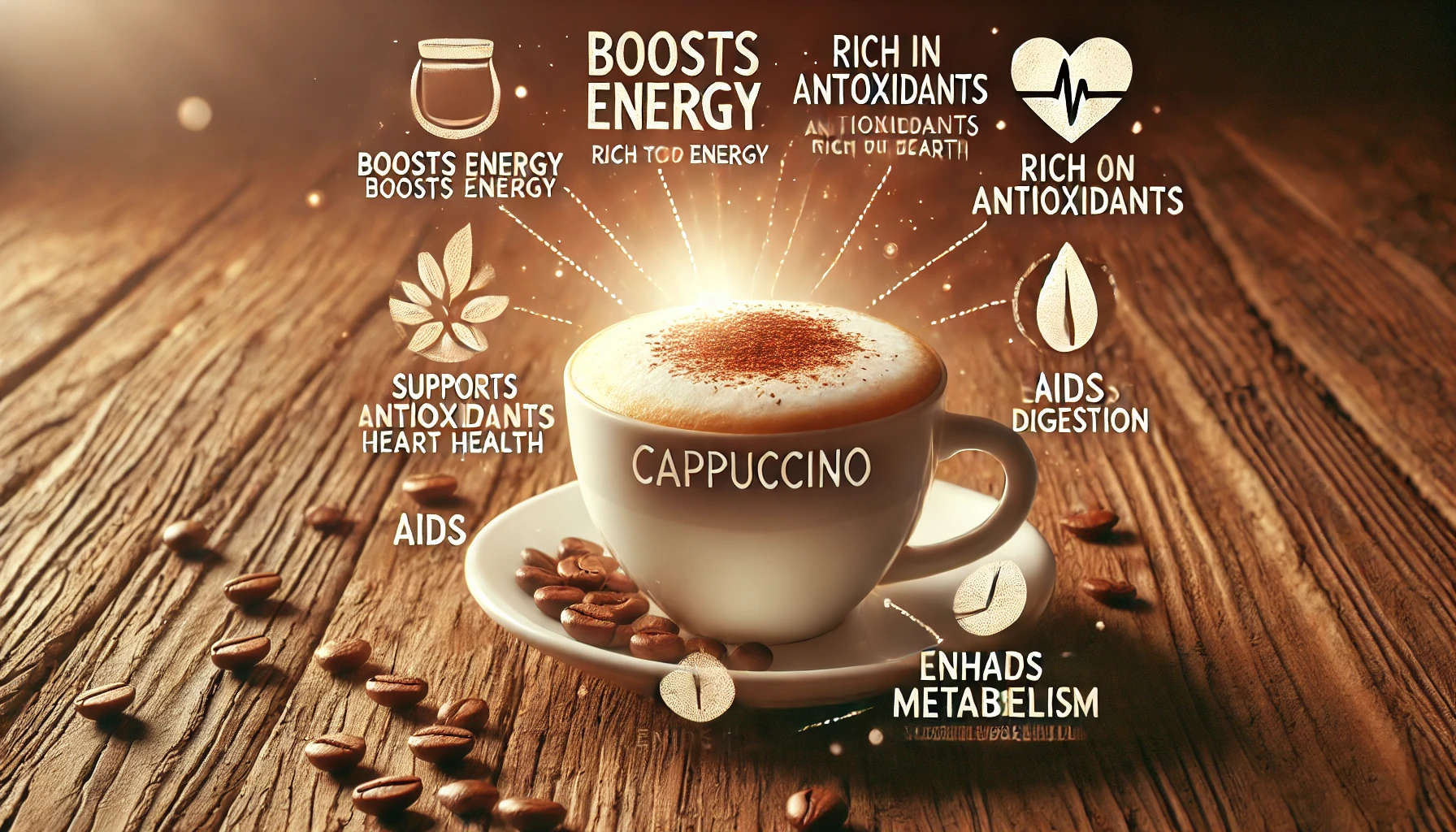Discover the top health benefits of cappuccino coffee, from boosting energy to improving heart health. Learn why this creamy delight is more than just a morning favorite.
Health Benefits of Cappuccino Coffee: Why It’s More Than Just a Drink
Cappuccino coffee is more than just a luxurious, frothy delight—it’s a powerhouse of health benefits that can positively impact your body and mind. With its perfect blend of espresso, steamed milk, and creamy foam, cappuccino offers a balanced caffeine boost, essential nutrients, and powerful antioxidants. But what makes this classic Italian coffee so special? Let’s dive deep into the science-backed health benefits of cappuccino coffee and why you should consider it as part of your daily routine.
What Are the Health Benefits of Cappuccino Coffee?
Cappuccino isn’t just about taste and aroma; it provides a range of health advantages that can improve overall well-being. From boosting energy levels to supporting heart health, here’s how this beloved beverage can benefit you.
1. Boosts Energy and Mental Focus ☕⚡
Feeling sluggish in the morning? One cup of cappuccino can kickstart your day with enhanced alertness and improved focus. Thanks to its rich caffeine content, cappuccino provides a steady energy boost without overwhelming your system.
Scientific Evidence: According to a 2021 study published in The Journal of Nutrition, Health & Aging, moderate coffee consumption improves cognitive function and memory retention, reducing the risk of neurodegenerative diseases like Alzheimer’s and Parkinson’s.
🔹 How it works:
- Caffeine blocks adenosine receptors, preventing drowsiness.
- Enhances dopamine production, keeping you motivated and focused.
- Improves reaction time, memory recall, and logical thinking.
📌 Pro Tip: To maximize mental benefits, drink cappuccino in the morning rather than late at night to avoid disrupting sleep cycles.
2. Rich in Antioxidants for Better Immunity 🍃💪
Antioxidants are the unsung heroes of good health, fighting free radicals and reducing oxidative stress. Cappuccino is packed with polyphenols, chlorogenic acids, and flavonoids, making it a natural shield against infections and diseases.
Did You Know?
According to the Harvard T.H. Chan School of Public Health, coffee is the biggest source of antioxidants in the Western diet, even more than fruits and vegetables.
📋 Key Antioxidants in Cappuccino:
- Chlorogenic Acids – Combat cellular damage and reduce inflammation.
- Polyphenols – Strengthen the immune system and improve gut health.
- Melanoidins – Possess antibacterial properties, protecting against infections.
🧐 Fun Fact: The Italian tradition of cappuccino dates back to the 17th century, and it was originally consumed by monks for its rejuvenating properties.
3. Supports Heart Health and Reduces Stroke Risk ❤️🩸
If you’re concerned about heart health, cappuccino can be a heart-friendly choice when consumed in moderation. Research suggests that moderate coffee intake (2–3 cups per day) lowers the risk of cardiovascular disease (CVD) and stroke.
📊 Statistics:
A 2022 meta-analysis published in The European Journal of Preventive Cardiology found that regular coffee drinkers had a 12% lower risk of heart disease and a 17% lower risk of stroke.
✔ How Cappuccino Benefits the Heart:
- Improves blood circulation, reducing hypertension risks.
- Lowers bad cholesterol (LDL) and increases good cholesterol (HDL).
- Reduces inflammation, a key factor in preventing heart disease.
📌 Important Note: Avoid excessive sugar or full-fat cream in your cappuccino to maximize its heart-friendly benefits.
See more: How to Brew a Perfect Cup of Coffee: Expert Tips & Methods
4. Enhances Metabolism and Aids in Weight Loss 🔥🏃♂️
Trying to shed some extra pounds? Cappuccino may be your secret weapon for weight loss! The caffeine and milk proteins in cappuccino help stimulate metabolism and burn fat faster.
📌 Scientific Insight:
A study in The American Journal of Clinical Nutrition found that caffeine increases metabolic rate by 3–11% and promotes fat oxidation.
🔥 How Cappuccino Helps in Weight Management:
- Caffeine triggers thermogenesis, increasing calorie burning.
- Milk proteins keep you fuller for longer, reducing unnecessary snacking.
- Enhances physical performance, making workouts more effective.
💡 Best Time to Drink Cappuccino for Weight Loss:
- Morning (before breakfast) – Kickstarts metabolism.
- Pre-workout – Boosts fat-burning efficiency.
5. Promotes Digestive Health 🦠✔
Cappuccino can also aid digestion and improve gut health, especially when made with quality milk and coffee beans.
🧐 Why Is Cappuccino Good for Digestion?
✔ Caffeine stimulates gastric acid, aiding in food breakdown.
✔ Warm milk soothes the stomach, reducing acidity issues.
✔ Probiotic-rich milk alternatives (like oat or almond milk) further support gut bacteria.
💡 Digestive-Friendly Tips:
- Avoid too much sugar to prevent gut inflammation.
- Lactose intolerant? Opt for plant-based milk options.
- Drink cappuccino after meals for the best digestive benefits.
Does Cappuccino Coffee Have Any Side Effects?
While cappuccino offers numerous health benefits, overconsumption can lead to certain side effects. It’s important to balance your intake and be aware of potential downsides.
Understanding Caffeine Sensitivity ☕⚠
Some people are more sensitive to caffeine’s stimulating effects, leading to issues like:
❌ Jitters or anxiety
❌ Heart palpitations
❌ Insomnia
🧐 What You Can Do:
- Stick to 1–2 cups per day.
- Avoid drinking cappuccino late in the evening.
- If sensitive, opt for decaf cappuccino.
How Much Cappuccino Is Too Much?
The FDA recommends a maximum caffeine intake of 400 mg per day—roughly 4 cups of regular coffee.
📌 Caffeine Content Comparison:
| Beverage | Average Caffeine Content |
|---|---|
| Cappuccino | 80 mg per cup |
| Espresso | 63 mg per shot |
| Americano | 95 mg per cup |
| Latte | 75 mg per cup |
💡 Best Practice: If you experience restlessness or sleep disturbances, reduce your intake and opt for a smaller serving.
Cappuccino vs. Other Coffee Drinks: Which One Is Healthier?
Many coffee lovers often debate: Is cappuccino better than other coffee drinks like lattes or americanos? The answer depends on what you’re looking for—flavor, health benefits, or caffeine content. Let’s break it down.
Cappuccino vs. Latte: What’s the Difference?
While both cappuccino and latte contain espresso and milk, their composition and health impact vary significantly.
📌 Key Differences:
| Feature | Cappuccino | Latte |
|---|---|---|
| Milk Content | Less milk, more foam | More milk, less foam |
| Caloric Value | Lower (approx. 120 kcal per cup) | Higher (approx. 190 kcal per cup) |
| Caffeine Content | 80 mg per cup | 75 mg per cup |
| Best For | Weight loss, metabolism boost | Creamier taste, prolonged energy |
Why Cappuccino is Healthier:
- Lower calorie count compared to lattes due to less milk.
- More foam reduces lactose intake, making it easier to digest.
- Higher concentration of espresso, leading to a stronger antioxidant boost.
Famous Figures Who Love Cappuccino:
- Leonardo da Vinci, a known coffee enthusiast, once described the invigorating effects of coffee in his writings.
- Ernest Hemingway, the iconic writer, enjoyed cappuccino in Parisian cafés while crafting some of his best works.
At Coffee Machine Nes, we’ve seen firsthand how cappuccino remains the preferred choice for coffee lovers who value both taste and health benefits. Learn more about our carefully designed cappuccino machines at coffeemachinenes.com.
Which One Has More Nutritional Value?
If you’re focusing on health-conscious coffee consumption, cappuccino is an excellent option. Unlike sugar-heavy flavored lattes, cappuccino offers a perfect balance of coffee and milk, providing protein, calcium, and antioxidants without excessive calories.
📌 Expert Opinion:
According to Dr. Frank Hu, a professor at Harvard T.H. Chan School of Public Health, moderate coffee intake (1-2 cups daily) reduces the risk of cardiovascular diseases and metabolic disorders.
If you’re aiming for a nutritious coffee experience, stick to unsweetened cappuccino and choose quality milk for added health benefits.
How to Make a Healthier Cappuccino at Home
Instead of consuming high-calorie coffee shop versions, making a healthier cappuccino at home ensures better quality and balanced nutrition.
Choosing the Right Ingredients
- Coffee Beans: Always go for high-quality arabica or robusta beans to ensure better antioxidants and rich flavors.
- Milk Options: Traditional whole milk adds creaminess, but healthier alternatives include almond, oat, or coconut milk.
- Sweeteners: Instead of processed sugar, try natural sweeteners like stevia, honey, or cinnamon.
Best Low-Calorie Sweeteners to Use
If you enjoy a hint of sweetness but don’t want extra calories, here are some options:
✔ Stevia – Zero calories, natural alternative.
✔ Monk Fruit Sweetener – Contains antioxidants, suitable for diabetics.
✔ Cinnamon – Enhances flavor while regulating blood sugar.
✔ Honey – Adds natural sweetness and boosts immunity.
Dairy vs. Plant-Based Milk: What’s Better?
Not everyone can tolerate dairy, and choosing the right milk can significantly impact digestion and calorie intake.
📌 Milk Comparison Chart:
| Type | Calories (per 100ml) | Protein | Best For |
|---|---|---|---|
| Whole Milk | 60 kcal | 3.2g | Creamy taste, nutrients |
| Skim Milk | 35 kcal | 3.4g | Low-calorie diet |
| Almond Milk | 30 kcal | 1.5g | Low-fat, lactose-free |
| Oat Milk | 45 kcal | 2.0g | High fiber, vegan-friendly |
🔹 Coffee Machine Nes recommends using oat milk for cappuccinos, as it offers a creamy texture with added digestive benefits.
Final Thoughts: Should You Drink Cappuccino for Health?
Cappuccino is more than just a morning indulgence—it’s a health-boosting beverage packed with antioxidants, metabolism-enhancing caffeine, and essential nutrients.
I’m Jeff Olson, and I love coffee. In fact, I’m something of a professional about coffee. I own and operate coffeemachinenes.com, one of the web’s top resources for everything coffee-related. I’m also an avid home barista, and enjoy experimenting with different brewing methods and flavor profiles. When I’m not nerding out about all things coffee, you can find me playing guitar or spending time with my wife and kids.

